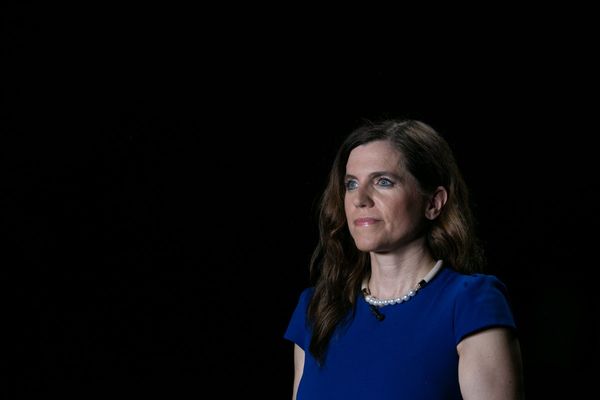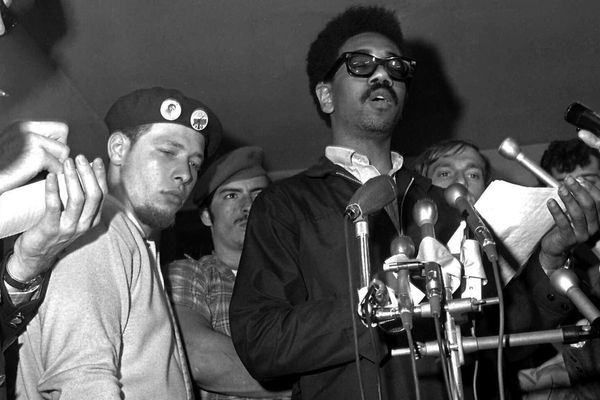
At last year’s G-7 meeting in France, U.S. President Donald Trump called out loud enough for several to hear, “Where’s my favorite dictator?” He was looking for Egyptian President Abdel Fattah al-Sisi, who led a military coup against the country’s democratically elected leader in 2013, before becoming president himself.
Trump’s offhand comment got at the uncomfortable heart of what has been a long-standing relationship between the United States and Egypt’s authoritarian rulers—a sort of alliance-despite-dictatorship that Trump took to new levels, often praising Sisi publicly. But with Trump on his way out the door, after losing the Nov. 3 election in resounding fashion to Joe Biden, Sisi is taking advantage of the Trump administration’s waning days to crack down even harder on human rights advocates at home.
This week, security forces arrested three senior members of one of the country’s most prominent, and few remaining, human rights groups, the Egyptian Initiative for Personal Rights (EIPR), just days after the organization hosted more than a dozen Western ambassadors and diplomats at its Cairo office—a move Egypt clearly felt it could get away with.
On Nov. 15, plainclothes security forces arrested Mohamed Basheer, EIPR’s administrative manager, in Cairo. Three days later, Karim Ennarah, EIPR’s criminal justice director, was arrested at a seaside restaurant in the Sinai resort town of Dahab. Both men’s names were added to a long-standing investigation into terrorism-related charges that already includes several other political detainees. At the time of Basheer’s arrest, EIPR’s executive director, Gasser Abdel Razek, said it was a direct response to the organization’s meeting with Western diplomats, and he expressed shock that “a security force would feel threatened by a meeting with ambassadors.”
The next day, Abdel Razek was arrested, too. They are now all in Tora Prison, a notorious jail near Cairo, adding to the estimated 60,000 political detainees in Egypt held on flimsy or trumped-up charges. The three have faced hours of questioning, including interrogations about their meeting with Western diplomats from countries considered allies of Egypt. The Swiss Embassy said the meeting was a briefing on the work of civil society in Egypt. Amnesty International has called the crackdown on the organization a “smear campaign” and says the charges are baseless.
Rights advocates say the United States and other Western states have for too long looked away from human rights abuses by friendly authoritarians across the Middle East, a trend that has only intensified under Trump, which in addition to flattering Sisi has deepened ties with Saudi Arabia even after the brutal killing of a Washington Post columnist in 2018. Biden has promised to crack down on global rights abusers—tweeting in July that there would be “[n]o more blank checks for Trump’s ‘favorite dictator’”—and Egypt seems willing to put that pledge to the test.
Since the EIPR arrests, there have been vocal condemnations and calls for their release from some prominent members of the U.S. Congress, including Sens. Elizabeth Warren and Bernie Sanders. Sanders called the arrests an “outrage,” adding, “The incoming administration must make it clear to Egypt and all countries that, once again, the United States will support democracy, not dictatorship.”
But so far, U.S. Secretary of State Mike Pompeo and other top administration officials have been silent on the arrests. Pompeo is currently traveling in the Middle East.
Egypt, like other countries across the region, is starting to recalibrate its relationship with a Washington not likely to be as forgiving of strong-arm tactics. Just days after Biden’s victory, Egypt hired the U.S. lobbying firm Brownstein Hyatt Farber Schreck on a $65,000-a-month retainer, suggesting Egypt may be worried that its relative impunity is coming to an end.
The close U.S.-Egypt relationship is in many ways a relic of a bygone era, said Michael Wahid Hanna of the Century Foundation. Born during the Cold War and tempered during decades of Soviet intromission in the Middle East, the relationship sought to give Washington a friendly bridgehead in a pivotal regional state. After the 1978 Camp David Accords and a peace treaty with Israel, billions of dollars in U.S. military funding poured into Egypt and made Cairo one of America’s top regional allies.
But that started to wobble during the Arab Spring. In early 2011, as Egypt began a vicious crackdown on protesting civilians, then-President Barack Obama gently called for political change in Egypt. Since then, internal turmoil and increasingly authoritarian rule in Egypt have put a public strain on U.S.-Egyptian relations.
“Egypt is now just a producer of headaches,” Hanna said.
The problem is, while the tone from the incoming Biden administration will almost surely be different from Trump’s, it’s not clear that Washington has meaningful levers to drive real change in Egypt. Biden will take office with a host of thorny domestic issues—including Trump’s effort to overturn the election and a raging coronavirus pandemic—that will keep a lot of foreign policy, let alone Egypt, well short of the top priority. But even if Biden wants to withdraw Sisi’s “blank checks,” it’s not clear how he will do it.
When Sisi ousted Mohamed Morsi in 2013, the country’s first democratically elected president, and began his crackdown on political opponents, Obama froze some U.S. aid to the country, but it seemed to have little impact. Egypt “basically called his bluff,” Hanna said. Two years later, the United States reinstated the aid.
Even on the rare occasions when Trump administration officials put pressure on Cairo, it seemed to do little good. In January, Mustafa Kassem, a 54-year-old Egyptian American auto parts dealer, died in an Egyptian prison after six years in custody with ailing health and without proper medical care. His case had been raised by Vice President Mike Pence, Pompeo, and several members of Congress. But even that high-level lobbying wasn’t a deterrent to a country that has enjoyed decades of relative impunity for its human rights abuses.
Hanna says diplomatic pressure clearly doesn’t work and it’s time for the United States to reevaluate its relationship with Egypt.
“The question is no longer how can we produce better political outcomes,” Hanna said. “The question is how complicit do we want to be in Egyptian political repression?”







